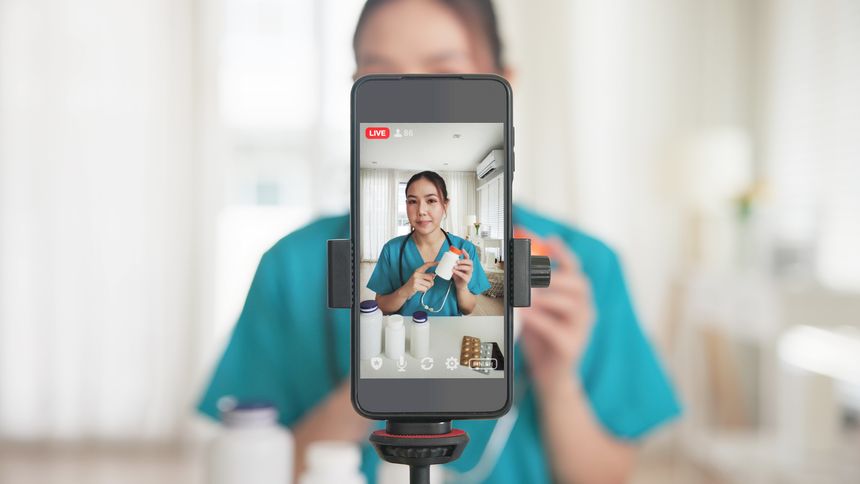On 11 September 2025, the Cologne Court of Appeals ("Court") delivered a landmark ruling on the shared responsibility of advertisers and paid influencers for posts on social media (case no. 6 U 118/24).
While the Court addressed key questions concerning the mandatory information requirements under the German Medicinal Products Advertising Act (Heilmittelwerbegesetz – “HWG”) and the statutory prohibition under the HWG to have celebrities endorse medicinal products to the public, the Court held that advertisers may be held directly responsible for content posted by influencers, at least in the context of paid partnerships.
Background
Core of the dispute was an 18-second social media video posted by an influencer to promote an over-the-counter medicinal product ("Post"). The plaintiff, a German trade association, sued the advertiser, a pharmaceutical company, (not the influencer) and applied for a restrictive order against the advertiser. The plaintiff argued that (i) the Post lacked of the mandatory HWG warning notice ('For risks and side effects, read the package leaflet and ask your doctor or pharmacist.') and (ii) using a well-known influencer contravened the HWG's prohibition on advertising medicinal products with endorsements from celebrities.
The defendant argued that (i) the mandatory HWG warning notice was, in fact, contained in the caption below the Post and (ii) the influencer would not qualify as a celebrity for the purposes of the HWG.
The Court confirmed the first instance judgment (Cologne Regional Court, judgment of 28 November 2024, case no. 33 O 181/24) and upheld the claim in full, dismissing the defendant's appeal.
Key rulings
HWG warning notice must appear in the video itself
The Court held that the mandatory HWG warning notice must form part of the advertising for medicinal products in audiovisual media, including social media reels. In the Court's view, displaying the HWG warning notice only in the caption, accompanying text, or via an external link would not be sufficient. Given the short attention span and fast-placed consumption of social media content, the Court stressed that the warning must be clearly visible and immediately perceivable within the moving image itself.
The Court rejected the defendant's argument that users could pause the video or easily access the caption and found the Post to be in breach of the HWG.
Influencers can be ‘celebrities’ for the purposes of the HWG
The Court held that the question whether an influencer qualifies as ‘celebrity’ for the purposes of the HWG needs to be assessed on a case-by-case basis, while the extent of influence and trust that the influencer enjoys among their followers would be the decisive criterion. By contrast, in the Court's view the question whether the influencer is a widely known person throughout the population shall be irrelevant.
Against this background, the Court concluded that the influencer, who had more than 100,000 followers, millions of views, and visibility across several platforms, qualified as celebrity for the purposes of the HWG. Accordingly, the Post was found to be in breach of the HWG.
Advertisers can be held responsible for content posted by paid influencers
The Court held that influencers engaged through paid partnerships are considered 'agents' of the advertiser within the meaning of the German Act against Unfair Commercial Practices (Gesetz gegen den unlauteren Wettbewerb – “UWG”).
Under the UWG, consumer protection associations, trade associations and competitors may bring legal actions before national civil courts against companies that have committed unfair commercial practices, such as breaches of the HWG. A key principle under the UWG is that companies will not only be responsible for their own breaches, but also for breaches committed by their agents.
The Court also suggested that the existence of a paid partnership may support the position that the advertiser and the influencer would qualify as ‘accomplices’.
Accordingly, the defendant (the advertiser) was held responsible for the Post, although the breaches were committed by the influencer.
Practical implications
This judgment does not establish an absolute ban on influencer marketing for medicinal products. However, paid partnerships for advertising medicinal products with influencers who have a significant number of followers should be avoided.
The judgment has a significant impact beyond medicinal products: The statutory concept of responsibility and liability for agents under the UWG is not limited to breaches of sector-specific advertising rules for medicinal products. Instead, also the general advertising rules that apply to advertising for all products and services across industries, including the statutory requirements surrounding misleading and aggressive advertising, fall within the scope of the UWG. Accordingly, advertisers may be held responsible and liable for a broad variety of breaches that may be committed by (paid) influencers.
When entering into paid partnerships with influencers, advertisers should consider implementing risk mitigations measures, including the following:
Select and instruct influencers carefully;
Agree on clear contractual obligations for influencers;
Conduct pre-publication compliance reviews of all social media posts; and
Monitor influencer content throughout the paid partnership.

/Passle/5db069e28cb62309f866c3ee/MediaLibrary/Images/2025-06-30-18-20-05-882-6862d555bf3898129ef17194.jpg)
/Passle/5db069e28cb62309f866c3ee/SearchServiceImages/2025-12-12-15-58-46-319-693c3bb62a1eb292d8bfc812.jpg)
/Passle/5db069e28cb62309f866c3ee/SearchServiceImages/2025-12-08-16-19-01-292-6936fa755b578955555c41c2.jpg)
/Passle/5db069e28cb62309f866c3ee/SearchServiceImages/2025-12-04-15-32-44-367-6931a99c9421fe7e50e0b072.jpg)
/Passle/5db069e28cb62309f866c3ee/SearchServiceImages/2025-12-03-16-04-59-359-69305fab186e029cfdb2acd9.jpg)